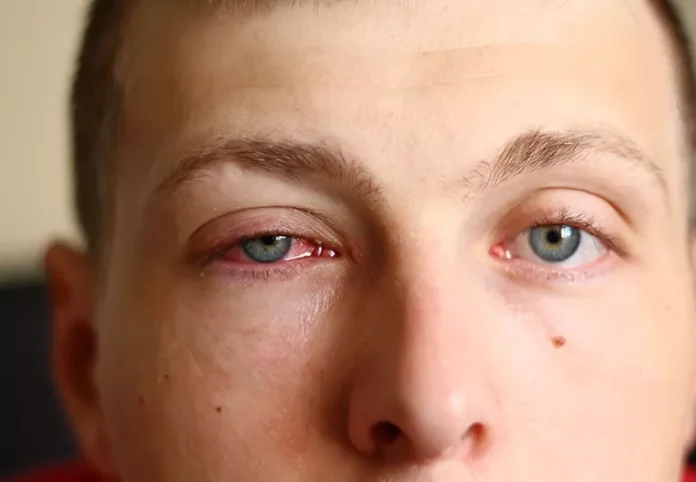Last Updated on June 26, 2024 by Silvy
Effective Remedies for Pink Eye: Heal and Prevent Spread
Pink eye, or conjunctivitis, is a common eye condition that can cause a lot of discomfort. Whether it’s due to allergies, bacteria, or viruses, dealing with pink eye can be a real hassle.
But don’t worry, we’ve got you covered. In this comprehensive guide, we’ll dive into effective remedies for pink eye, how to heal it, and most importantly, how to prevent its spread.
Understanding Pink Eye
What is Pink Eye?
Pink eye, medically known as conjunctivitis, is an inflammation of the conjunctiva—the thin, transparent layer of tissue that lines the inner surface of the eyelid and covers the white part of the eye.
This condition can affect one or both eyes and is often characterized by redness, itching, and a gritty feeling in the eye.
Types of Pink Eye
- Viral Conjunctivitis: Caused by viruses like adenovirus. It’s highly contagious and usually spreads through respiratory droplets.
- Bacterial Conjunctivitis: Caused by bacteria such as Staphylococcus aureus or Streptococcus pneumoniae. It’s also contagious and can spread through direct contact with infected individuals or surfaces.
- Allergic Conjunctivitis: Triggered by allergens like pollen, dust, or pet dander. It’s not contagious but can be quite bothersome.
- Chemical Conjunctivitis: Resulting from irritants like chlorine in swimming pools or exposure to noxious chemicals.

Symptoms of Pink Eye
Common Symptoms
- Redness in the white of the eye or inner eyelid
- Increased amount of tears
- Thick yellow discharge that crusts over the eyelashes, especially after sleep
- Itchy eyes
- Burning eyes
- Blurred vision and sensitivity to light

Effective Remedies for Pink Eye
Warm Compresses
A warm compress can help reduce the discomfort associated with pink eye. It soothes the eye, reduces inflammation, and helps to loosen any crusty discharge that might be present.
How to Apply:
- Soak a clean cloth in warm water.
- Wring out the excess water.
- Place the cloth gently over your closed eyelids for about 10-15 minutes.
- Repeat several times a day.
Cold Compresses
Cold compresses can be particularly effective for allergic conjunctivitis. They help to reduce swelling and itching.
How to Apply:
- Wrap ice cubes in a clean cloth or use a cold gel pack.
- Place it over your closed eyelids for a few minutes.
- Do this several times a day for relief.
Over-the-Counter Eye Drops
There are various over-the-counter (OTC) eye drops available that can provide relief from pink eye symptoms. Lubricating eye drops, also known as artificial tears, can help to flush out irritants and allergens.
Types of Eye Drops:
- Lubricating Eye Drops: To relieve dryness and irritation.
- Antihistamine Eye Drops: For allergic conjunctivitis to reduce itching and redness.
- Decongestant Eye Drops: To reduce redness (use sparingly as they can cause rebound redness).
Maintaining Good Hygiene
Practicing good hygiene is crucial in managing and preventing the spread of pink eye.
Hygiene Tips:
- Wash your hands frequently with soap and water.
- Avoid touching or rubbing your eyes.
- Use a clean towel and washcloth each day.
- Avoid sharing personal items like towels, cosmetics, or eye drops.
Proper Cleaning of Contact Lenses
If you wear contact lenses, it’s essential to clean them properly and regularly.
Cleaning Tips:
- Always wash your hands before handling your contacts.
- Use fresh contact lens solution each time you clean and store your lenses.
- Avoid wearing contact lenses until your pink eye has completely healed.

Preventing the Spread of Pink Eye
Quarantine Measures
If you have pink eye, try to stay home from work or school to avoid spreading it to others. This is especially important for viral and bacterial conjunctivitis.
Avoid Sharing Personal Items
Personal items like towels, pillowcases, and makeup can easily spread pink eye. Ensure that these items are not shared with anyone.
Clean Surfaces Regularly
Disinfect commonly touched surfaces like doorknobs, light switches, and countertops to reduce the risk of spreading the infection.
Replace Makeup and Personal Care Items
Discard any eye makeup or personal care items that you were using when you developed pink eye. Bacteria and viruses can linger on these items, leading to reinfection.

When to See a Doctor
Severe Symptoms
If you experience severe pain, intense redness, swelling, or if your vision is affected, seek medical attention immediately. These could be signs of a more serious condition.
Prolonged Symptoms
If your symptoms persist for more than a week without improvement, it’s time to see a healthcare provider. You may need prescription medication to help clear the infection.
Immunocompromised Individuals
If you have a weakened immune system or an underlying health condition, consult a doctor promptly to avoid complications.

Home Remedies for Pink Eye
Honey and Warm Water
Honey has natural antibacterial properties that can help soothe and heal pink eye.
How to Use:
- Mix one teaspoon of honey in a cup of warm water.
- Stir well until the honey is dissolved.
- Use a clean dropper to place a few drops in the affected eye.
Aloe Vera Gel
Aloe vera is known for its soothing and anti-inflammatory properties.
How to Use:
- Extract fresh aloe vera gel from a leaf.
- Dilute it with a little water.
- Apply it gently around the eyes using a clean cotton pad.
Tea Bags
Tea contains bioflavonoids that can help reduce inflammation and fight bacterial and viral infections.
How to Use:
- Steep a tea bag (preferably black or green tea) in hot water.
- Let it cool down.
- Place the tea bag over your closed eyelid for about 10 minutes.
Breast Milk
Breast milk contains antibodies that can help fight infections.
How to Use:
- Using a clean dropper, place a few drops of breast milk in the affected eye.
- Repeat a few times a day for relief.
Turmeric
Turmeric has powerful anti-inflammatory and antimicrobial properties.
How to Use:
- Mix a teaspoon of turmeric powder in a cup of warm water.
- Use a clean cloth to apply the mixture as a compress to the affected eye.

Diet and Nutrition
Vitamin A
Vitamin A is crucial for maintaining good eye health. Include foods rich in vitamin A like carrots, sweet potatoes, and spinach in your diet.
Omega-3 Fatty Acids
Omega-3 fatty acids can help reduce inflammation. Include sources like fish, flaxseeds, and walnuts in your diet.
Hydration
Staying hydrated is essential for overall eye health. Drink plenty of water throughout the day to keep your eyes moist and reduce irritation.

Myths About Pink Eye
1. Pink Eye is Always Contagious
While viral and bacterial conjunctivitis are contagious, allergic and chemical conjunctivitis are not. Understanding the type of pink eye you have is crucial.
2. You Can’t Prevent Pink Eye
Practicing good hygiene and taking preventive measures can significantly reduce the risk of contracting pink eye.
3. Pink Eye is Harmless
While pink eye is often mild, it can lead to serious complications if left untreated, especially in cases of bacterial conjunctivitis.
FAQs About Pink Eye
Can Pink Eye Heal on Its Own?
Yes, mild cases of pink eye can heal on their own within a few days to two weeks. However, severe cases might require medical treatment.
Can I Wear Contact Lenses with Pink Eye?
It’s best to avoid wearing contact lenses until your pink eye has completely healed to prevent further irritation and infection.
Is Pink Eye More Common in Children?
Yes, children are more susceptible to pink eye, especially viral and bacterial types, due to their close contact in school and playground settings.
Can Pets Get Pink Eye?
Yes, pets can get pink eye. If you notice symptoms in your pet, consult a veterinarian for appropriate treatment.
How Can I Tell if My Pink Eye is Viral or Bacterial?
Viral pink eye usually involves a watery discharge, while bacterial pink eye often has a thicker, yellow-green discharge. A doctor can provide an accurate diagnosis.
Is Pink Eye Related to COVID-19?
In some cases, conjunctivitis has been reported as a symptom of COVID-19. If you suspect you have COVID-19, seek medical advice.
Can Allergic Pink Eye Become Chronic?
Yes, allergic conjunctivitis can become chronic if you’re continuously exposed to allergens. Managing your environment and using antihistamines can help control symptoms.
Conclusion
Dealing with pink eye can be uncomfortable, but with the right remedies and preventive measures, you can heal quickly and prevent it from spreading.
Remember to maintain good hygiene, use home remedies wisely, and seek medical attention if necessary. By taking these steps, you’ll be on your way to clear, healthy eyes in no time.
References:
- American Academy of Ophthalmology. (2021). Conjunctivitis (Pink Eye). Retrieved from [AAO](https://www.aao.org/eye-health/diseases/what-is-conjunct


